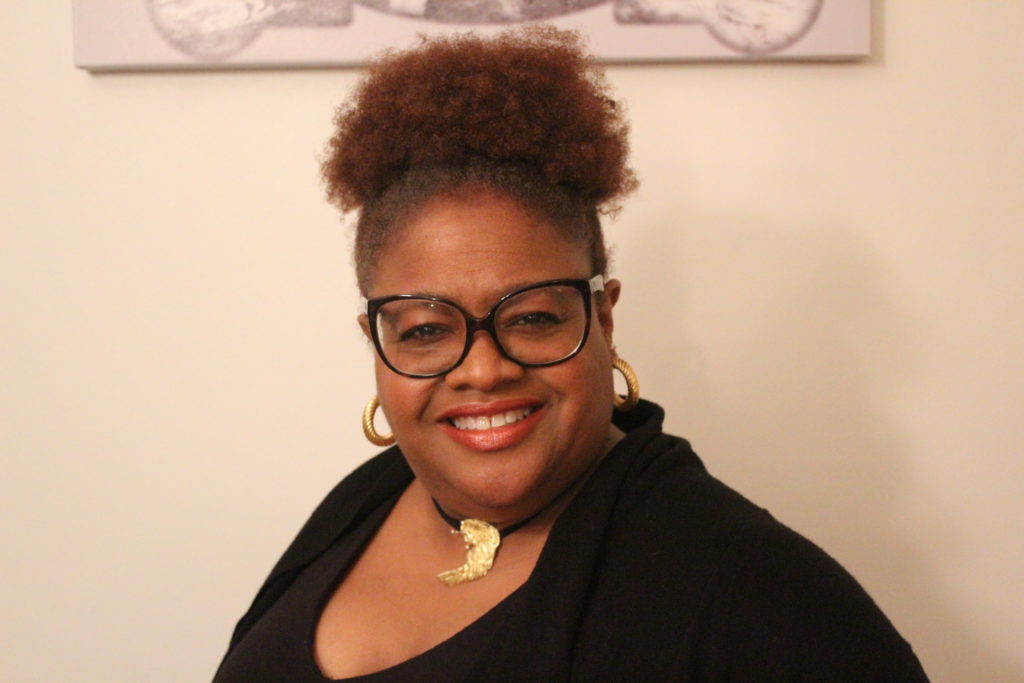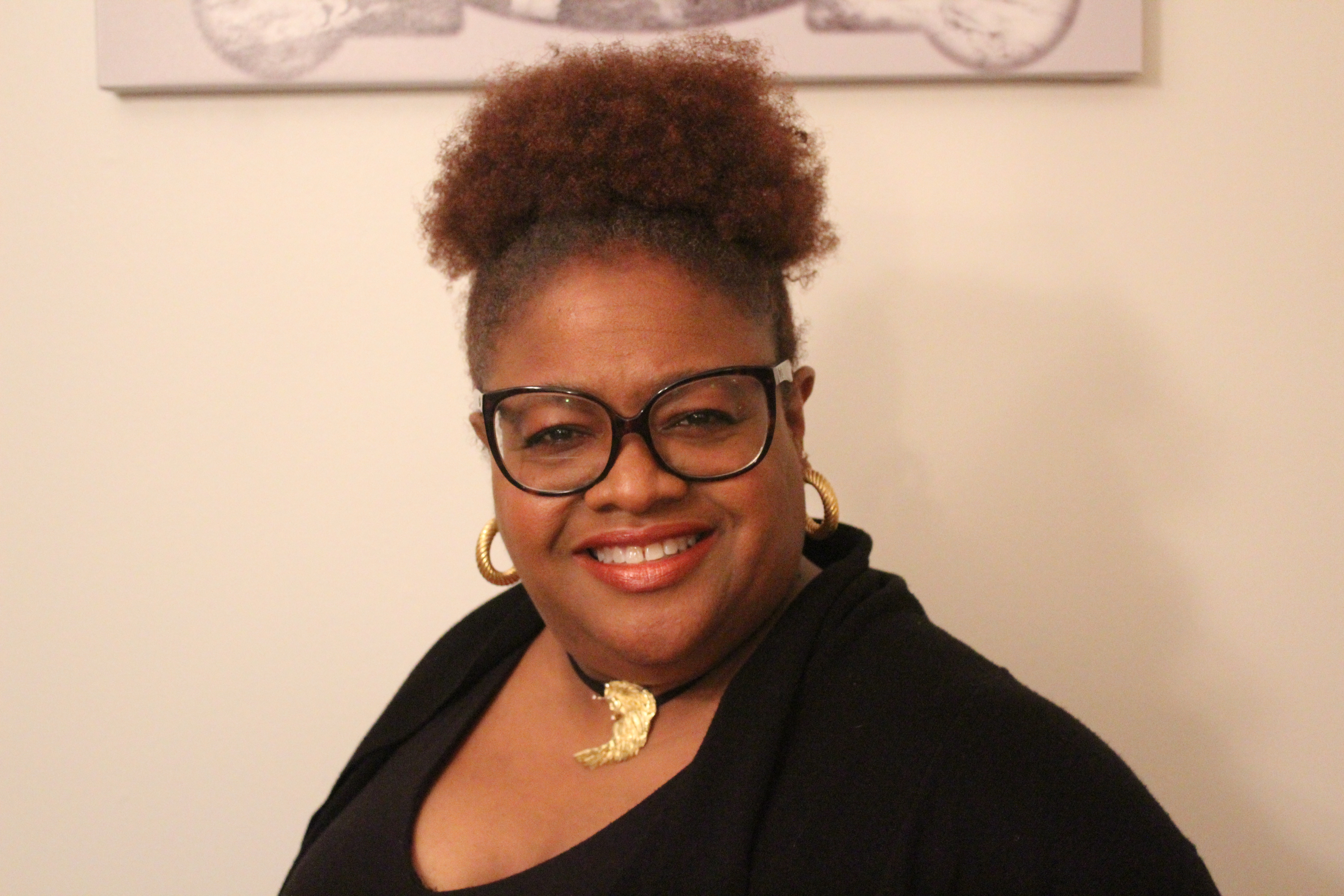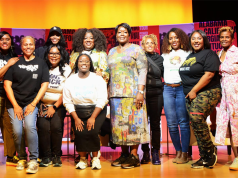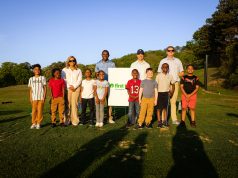By Ariel Worthy
The Birmingham Times

Lisa McNair knows the positive impact of having a pet in the home.
Growing up with a dog in the house was great therapy, said McNair, executive assistant at Hand In Paw (HIP), a Birmingham, Ala.–based nonprofit.
“My dog was my friend,” McNair said. “I was a homebody. I loved going out in the backyard with my dog and playing with him. Dogs are so smart, and they give you so much unconditional love.”
At HIP, volunteers and their pets provide animal-assisted therapy. Each participant is trained with a pet and then visits people in nursing homes, hospitals, and various facilities throughout the city.
McNair, who has been working at HIP since 2006, said she would like to see more diversity in the organization.
“It’s not because we’re not trying, but we would love to have more African-Americans bring their pets and be part of our team,” she said. “We would like more young African-Americans to be part of our junior board and participate or volunteer in any way they’d like.
Pawsitive Living
HIP offers three primary programs: Pawsitive Living; Petscription; and Sit, Stay, Read.
Pawsitive Living is a 12-week anger-management program for at-risk youth.
“We have animals incorporated in the programs,” said McNair. “A lot of children might be standoffish with adults, but having a dog there might calm them or make them open up more.”
Petscription is a therapeutic program through which animals and their owners go to hospitals, nursing homes, and various facilities to visit patients.
“It’s been proven that being around animals can help decrease blood pressure,” McNair said. “There was a child who had been in an accident that left her paralyzed. She had not smiled since the accident, and had been very sad. The nurse took the girl’s hand to let her pet the dog, and the girl began to smile.”
Petscription is not just for hospital patients, McNair said: “We’ve taken dogs to nursing homes, as well. There have been cases in which a person has been despondent and hasn’t spoken for days or weeks. When a dog is put in the bed, the person starts talking about his or dog and just comes back to life.”
Sit, Stay, Read is a program in schools throughout the Jefferson and Tuscaloosa counties for children who have trouble reading.
“Weekly, the kids meet with these therapy teams and read to the dogs,” McNair said. “It’s great because [the dogs] are nonjudgmental, so if the student messes up a word the dog isn’t going to say, ‘Aw, you messed that up. Read that over again.’ The kids push through and do a better job to improve their reading skills.”
It wasn’t until after joining HIP that McNair, who is “over 40,” said she recognized the fear of dogs in the black community.
“I think the fear hails back to the civil rights times, when dogs were used to attack African-Americans,” she said. “When I started working at HIP, they said, ‘Ask some of your friends to volunteer.’ When I thought about it, I realized that only one of my friends had a dog.”
HIP tried to break the stigma of dogs being dangerous last year at the Birmingham Civil Rights Institute.
“Last year, HIP brought inner-city school kids and therapy teams in and showed them that dogs can be used for many good things, and they can be helpful and kind,” she said.
Very Different World
McNair knows how having a dog has helped her get through difficult times. McNair’s oldest sister, Denise, was the youngest victim in the Sixteenth Street Baptist Church bombing. Although McNair never met her sister, the bombing has always been part of her life.
“It’s my oldest memory, knowing that she was killed,” McNair said. “For about the next 20 years after she was killed we attended that church, and it was always a sad thing to know I had a big sister that I never got to meet and got to know, and that she was taken in such a sad and tragic way.”
Although she never met her sister, NcNair keeps Denise’s legacy alive by telling her story. McNair travels across the nation and talks about civil rights, the bombing, and her family.
“When I was first asked to speak about [Denise], I was wondering, ‘How I am going to do this? I never met her.’ But I’d heard many stories from my parents, so I usually just start out with the facts,” she said.
McNair’s parents are the only living parents of the victims. Her father, Chris McNair, is currently 81 and no longer grants interviews.
“Many people don’t know that Denise was the only child when she was killed,” she said. “Denise was 11. My parents tried to have other children, but my mother had not been able to carry another child to full term. So, when Denise died it was particularly devastating because they didn’t know if they could have any more children. But God is good, and He is faithful, and a year and four days after Denise was killed, I was born. My sister Kimberly was born four years after me.”
McNair, who lives on the Southside with her dog, Banjo, is also owner of Posh Photographers and Lisa McNair’s Business & Social Stationery. She is working on her memoir, which she hopes to have done by the anniversary of her sister’s death this fall.
“Many people don’t talk about the generation of children after segregation and what our lives were like in an integrated society. Just a few years before I was born, my sister Denise lived in a world that was very different from mine,” McNair said. “The places I’ve gone, she could never have gone and seen. I did not experience colored water fountains and restrooms. So, there’s a story to be told about my family, my life, and the growing pains of integration from the perspective of an African-American family that had experienced a tragedy.”





